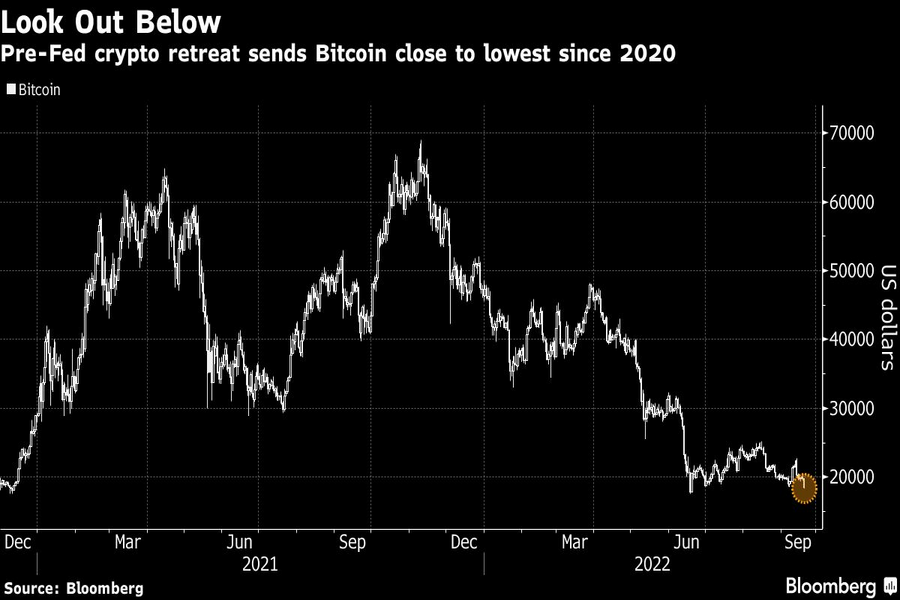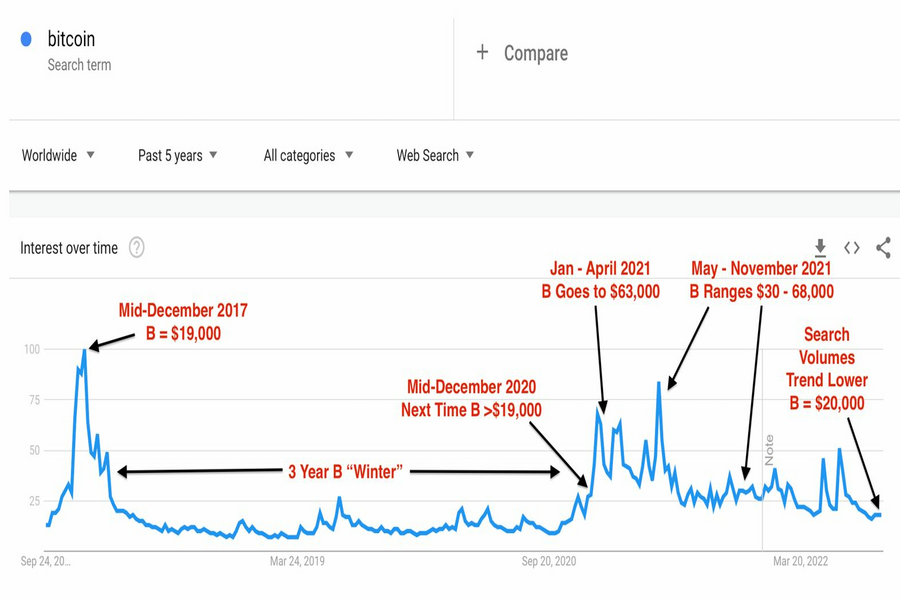

A slide in cryptocurrencies Monday sent Bitcoin to a three-month low as sentiment took a knock from a wave of monetary tightening that’s set to stretch from Europe to the U.S. this week.
The largest digital token sank as much as 7.4% to $18,273 before paring losses. That’s the lowest since digital-asset prices tumbled after the collapse of crypto lender Celsius in June. Ether shed up to 6.6%, struggling to hold the $1,300 mark. Coins like XRP and Polkadot posted heavier losses.
Investors are bracing for volatility from the jumbo Federal Reserve interest-rate hike expected Wednesday to fight price pressures. Higher borrowing costs are sapping the liquidity that the crypto sector relies on.

The backdrop is such that “in this inflationary environment macro trumps everything,” wrote Antoni Trenchev, managing partner at crypto lender Nexo.
Ether, the second-largest token, was at a two-month low. A jump in the coin since mid-June — spurred by hype around an upgrade of the Ethereum blockchain to slash energy usage is unwinding now the revamp is done.
An additional token investors received after the Ethereum revamp continued to tumble. EthereumPOW, as the offshoot is known, represents much of the legacy computing operations of the blockchain that chose not to participate in the software update. It was down 40%, according to CoinGecko data.
The XRP token affiliated with Ripple Labs Inc. was among the biggest decliners, shedding as much as 13.5%. That came amid reports that the firm and the Securities and Exchange Commission prefers an immediate ruling in a court case over whether Ripple was “reckless” in claiming XRP isn’t a regulated security.
Meanwhile, interest in digital currencies has waned, according to Google trends data compiled by Nicholas Colas of DataTrek Research. Search volumes have trended lower as Bitcoin fell toward $20,000 this year.
Bitcoin “works best when new investors come into the fold with fresh money. It is hard to argue that the current global investment and economic environments favor speculative asset classes,” Colas wrote in a note. “There will be a time to look at virtual currencies from the long side; we just think it is a bit too soon to consider that trade now.”

The market value of digital tokens is down more than $70 billion in the past 24 hours to $941 billion — a far cry from the $3 trillion peak in 2021, according to CoinGecko figures. Tightening financial conditions and spectacular blowups at leveraged crypto firms sparked a rout in prices this year.
Bitcoin is down almost 60% this year. If the price drops below the $17,599 reached on June 18, it would be at the lowest level since December 2020.

A new proposal could end the ban on promoting client reviews in states like California and Connecticut, giving state-registered advisors a level playing field with their SEC-registered peers.

Morningstar research data show improved retirement trajectories for self-directors and allocators placed in managed accounts.

Some in the industry say that more UBS financial advisors this year will be heading for the exits.

The Wall Street giant has blasted data middlemen as digital freeloaders, but tech firms and consumer advocates are pushing back.

Research reveals a 4% year-on-year increase in expenses that one in five Americans, including one-quarter of Gen Xers, say they have not planned for.
Orion's Tom Wilson on delivering coordinated, high-touch service in a world where returns alone no longer set you apart.
Barely a decade old, registered index-linked annuities have quickly surged in popularity, thanks to their unique blend of protection and growth potential—an appealing option for investors looking to chart a steadier course through today's choppy market waters, says Myles Lambert, Brighthouse Financial.
